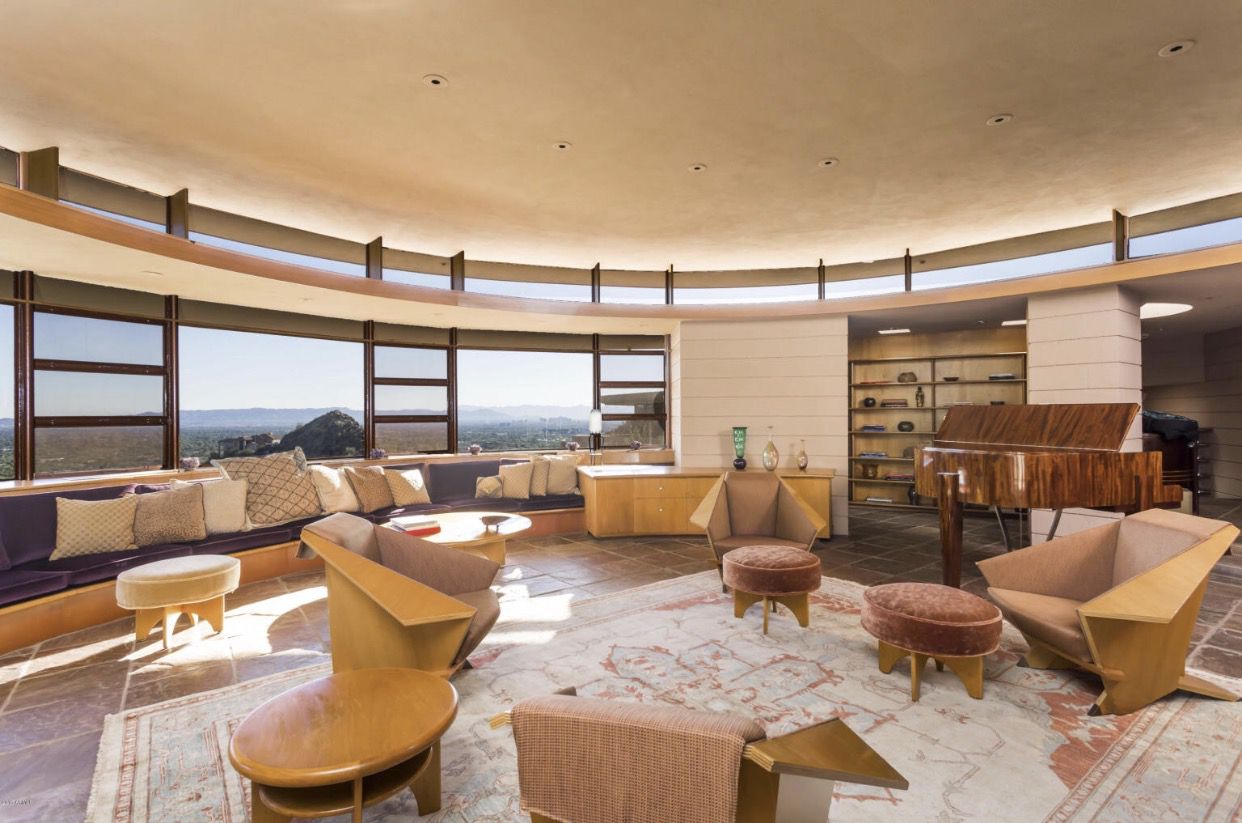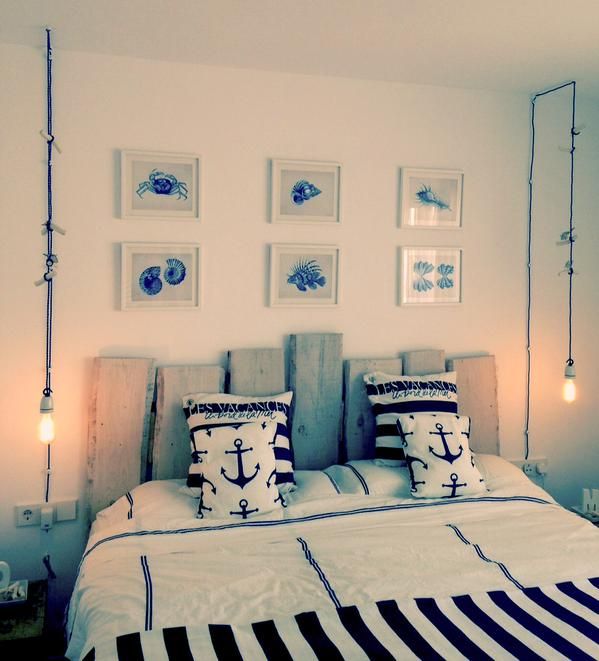With a prolific career, extensive back catalogue and unique style, Frank Lloyd Wright is the seminal American architect. His influence, which transcends architecture, is still felt today. So, as his final design hits the market, we countdown our favourite Frank Lloyd Wright masterpieces.
 Image courtesy of Estately
Firstly, let's start at the end. Norman Lykes' House was the final design Frank completed before his death in 1959. Construction was finished posthumously, situated on the site Frank hand-picked in Pheonix Arizona. Currently on the market for a cool $3.25 million, the property is a rare opportunity to own one of Frank's iconic designs. Boasting big views, a connection to its environment and bespoke furnishings, Norman Lykes' House bears Franks signature touches. The main room is curved, creating full panoramic views from all angles (an ever-popular architectural hack). Its hilltop fort facade looks a prime spot to keep tabs on the enemy or, to start that cult you've been thinking about.
Image courtesy of Estately
Firstly, let's start at the end. Norman Lykes' House was the final design Frank completed before his death in 1959. Construction was finished posthumously, situated on the site Frank hand-picked in Pheonix Arizona. Currently on the market for a cool $3.25 million, the property is a rare opportunity to own one of Frank's iconic designs. Boasting big views, a connection to its environment and bespoke furnishings, Norman Lykes' House bears Franks signature touches. The main room is curved, creating full panoramic views from all angles (an ever-popular architectural hack). Its hilltop fort facade looks a prime spot to keep tabs on the enemy or, to start that cult you've been thinking about.
 Following that foray into the public sector, we're coming back home. Many still regard Fallingwater as Wright's greatest residential design. Situated in rural Pennsylvania, the build marks Wright's finest execution of organic architecture. Constructed partially atop a waterfall on the Bear Run river, Fallingwater utilises cantilever concrete layers for a stable and eye-catching construction. On first viewing, the property reminded us of the wonderfully (eerily) remote setting of 2014 Sci-Fi tour de force Ex. Machina (actually shot here). Personally, as a pathological introvert, Fallingwater looks like paradise.
Following that foray into the public sector, we're coming back home. Many still regard Fallingwater as Wright's greatest residential design. Situated in rural Pennsylvania, the build marks Wright's finest execution of organic architecture. Constructed partially atop a waterfall on the Bear Run river, Fallingwater utilises cantilever concrete layers for a stable and eye-catching construction. On first viewing, the property reminded us of the wonderfully (eerily) remote setting of 2014 Sci-Fi tour de force Ex. Machina (actually shot here). Personally, as a pathological introvert, Fallingwater looks like paradise.
 Finally, a prime example of Frank Lloyd Wrights Usonian style, Mrs. Clinton Walker house sits hidden away on the California coast. A large load bearing fireplace takes centre stage in the living space, while floor to ceiling windows lend an unhindered coastal view. Frank made use of local materials, using Carmel slabs to clad the exterior. Once again, Wright intended to create a near-seamless blend between property and surroundings. The blue-green copper roof (originally baked shingle tiling), angles to a point and blends with the sea and sky. We love it because...well I mean, just look at it! Sitting in landlocked West Yorkshire, those ocean views are filling us with envy.
So, with over 500 properties in his portfolio, there is bound to be a Frank Lloyd Wright to capture your imagination. What's your favourite?
Finally, a prime example of Frank Lloyd Wrights Usonian style, Mrs. Clinton Walker house sits hidden away on the California coast. A large load bearing fireplace takes centre stage in the living space, while floor to ceiling windows lend an unhindered coastal view. Frank made use of local materials, using Carmel slabs to clad the exterior. Once again, Wright intended to create a near-seamless blend between property and surroundings. The blue-green copper roof (originally baked shingle tiling), angles to a point and blends with the sea and sky. We love it because...well I mean, just look at it! Sitting in landlocked West Yorkshire, those ocean views are filling us with envy.
So, with over 500 properties in his portfolio, there is bound to be a Frank Lloyd Wright to capture your imagination. What's your favourite?
Norman Lykes' House
 Image courtesy of Estately
Image courtesy of Estately
Solomon R. Guggenheim Museum
Frank Lloyd Wright's most notable public work (and quite possibly his best), the Solomon R. Guggenheim Museum remains one of the most iconic buildings in New York. By no means an instant critical success, some detractors felt the building's design would overshadow the artwork on display. The basic structure, wrapped around a central atrium, consists of gently sloping spirals. The layout is open, allowing light to fill the expansive interior. The Guggenheim represented a bold step away from traditional gallery design, focusing solely on visitor experience. For the best trip, take the atrium elevator to the top floor and slope downwards through the exhibits.R. W. Lindholm Service Station
From revolutionising how you explore art, Wright decided to tackle how people pumped gas (petrol to you and me). Throughout his active years, Wright worked on revolutionising urban planning. His designs for an urban sprawl, Broadacre City, were never fully realised. Sadly, R. W. Lindholm Service Station was the only design from this project that came to fruition. Built in the same year as the Guggenheim, Lindholm adopts a vastly different aesthetic. Where the fifth avenue marvel is full of curves and slopes, here angles rule. The highlight is an angular copper roof, overhanging the pumps creating an ornate arrow-shaped canopy. We love the fact that a building constructed in 1958 can look this futuristic. Also, it's a gas station!Fallingwater
 Following that foray into the public sector, we're coming back home. Many still regard Fallingwater as Wright's greatest residential design. Situated in rural Pennsylvania, the build marks Wright's finest execution of organic architecture. Constructed partially atop a waterfall on the Bear Run river, Fallingwater utilises cantilever concrete layers for a stable and eye-catching construction. On first viewing, the property reminded us of the wonderfully (eerily) remote setting of 2014 Sci-Fi tour de force Ex. Machina (actually shot here). Personally, as a pathological introvert, Fallingwater looks like paradise.
Following that foray into the public sector, we're coming back home. Many still regard Fallingwater as Wright's greatest residential design. Situated in rural Pennsylvania, the build marks Wright's finest execution of organic architecture. Constructed partially atop a waterfall on the Bear Run river, Fallingwater utilises cantilever concrete layers for a stable and eye-catching construction. On first viewing, the property reminded us of the wonderfully (eerily) remote setting of 2014 Sci-Fi tour de force Ex. Machina (actually shot here). Personally, as a pathological introvert, Fallingwater looks like paradise.
Mrs. Clinton Walker House
 Finally, a prime example of Frank Lloyd Wrights Usonian style, Mrs. Clinton Walker house sits hidden away on the California coast. A large load bearing fireplace takes centre stage in the living space, while floor to ceiling windows lend an unhindered coastal view. Frank made use of local materials, using Carmel slabs to clad the exterior. Once again, Wright intended to create a near-seamless blend between property and surroundings. The blue-green copper roof (originally baked shingle tiling), angles to a point and blends with the sea and sky. We love it because...well I mean, just look at it! Sitting in landlocked West Yorkshire, those ocean views are filling us with envy.
So, with over 500 properties in his portfolio, there is bound to be a Frank Lloyd Wright to capture your imagination. What's your favourite?
Finally, a prime example of Frank Lloyd Wrights Usonian style, Mrs. Clinton Walker house sits hidden away on the California coast. A large load bearing fireplace takes centre stage in the living space, while floor to ceiling windows lend an unhindered coastal view. Frank made use of local materials, using Carmel slabs to clad the exterior. Once again, Wright intended to create a near-seamless blend between property and surroundings. The blue-green copper roof (originally baked shingle tiling), angles to a point and blends with the sea and sky. We love it because...well I mean, just look at it! Sitting in landlocked West Yorkshire, those ocean views are filling us with envy.
So, with over 500 properties in his portfolio, there is bound to be a Frank Lloyd Wright to capture your imagination. What's your favourite?






Leave a comment
This site is protected by hCaptcha and the hCaptcha Privacy Policy and Terms of Service apply.